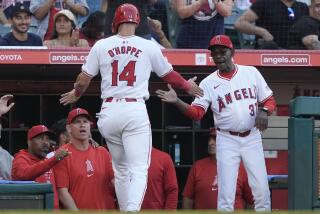Leftwich Figures This Is His Year
- Share via
MILWAUKEE — He throws right-handed and everybody calls him Lefty.
He has all of four career major league victories to his name and the Angels call him their No. 3 starter.
He is the answer to the Angels’ half-prayer, half-trivia question, “Langston and Finley and then . . . and then?”--usually prompting blank stares all around and a roomful of head scratching.
And that’s after you spot the room his first and last names.
It isn’t easy being Phil Leftwich, as 8,788 aspiring Eskimos discovered on a frigid Friday evening in Milwaukee. With a small band of Brewer fans shivering in the stands, a smaller band of Brewers made Leftwich’s 13th big-league start truly Friday the 13th.
Leftwich learned, for instance, that it is bad luck to surrender three runs in the first inning to a team generally regarded as the Mets of the American League. Better to step on a crack in the sidewalk while carrying a black cat under a ladder than to serve up three RBIs to Jody Reed (he had 31 in 1993) or a game-breaking home run to Kevin Seitzer (he averages seven per season), but Leftwich messed with superstition more than once and paid for it with a 5-1 loss and sixth-inning hook.
Leftwich is now 4-7 as a major-league starting pitcher. His earned-run average as an Angel is 4.05. He has thrown 86 2/3 innings on this level. And he is more important to the Angels’ hopes of contention, such as they are, than any pitcher not named Langston, Finley or Grahe.
“If we do anything this year,” Manager Buck Rodgers says, “Phil, first of all, has to pitch well enough to stay in the rotation the whole year. If he does that, he should finish close to .500, maybe one game above, 12-12, 13-12, whatever.
“If he does that, that’s all we can expect of Phil Leftwich. If he can do that, we ought to have enough to win with him.”
The order is taller than it seems, considering that Leftwich has never won more than 11 games on any level in any professional season. This time last year, Leftwich was a Triple-A pitcher with a boarding pass for Double-A. That ticket was never punched, but after a series of April shellings, the Angels thought long and hard about sending Leftwich back to Midland for remedial work in Large Inning Avoidance.
“I knew going into spring training last year that I’d be fighting for a job in Triple-A,” Leftwich said. “The year before, I had a bad year in Double-A. The whole season I was battling arm problems.
“But this time last year, I came back and was throwing the ball well. My big problem was giving up the big inning, kind of like tonight. I’d throw five scoreless innings, then give up a five-run inning.”
Leftwich started 2-6 at Vancouver, then won five of his next six decisions. When Scott Sanderson held his annual July blowout, the Angels sent for Leftwich, threw him out there against Oakland on July 29 and watched him lose, 2-1, to Bob Welch, no disgrace.
Leftwich lost two more starts, then went 4-3 from Aug. 15 on. The Angels, who would hand Joe Magrane a four-year, $13.3-million contract on the basis of three starts, immediately christened Leftwich a cornerstone to their starting rotation.
Of course, with the Angels, a cornerstone can be a relative thing.
Rodgers describes Leftwich’s four-pitch repertoire as “average across the board.” On the Angels, this is high praise.
“When I say ‘average,’ I don’t mean that’s bad,” Rodgers says. “The major-league average is not bad.
“What I’m saying is the he does not have one predominant pitch. He’s close to average across the board, which means he has to get all his pitches over the plate and keep all four pitches alive in the hitters’ minds.
“Because if you narrow him to one pitch, and you need him to get outs solely on his fastball, you could get in trouble. He has a good fastball, not an outstanding fastball.”
And when you’re close to average, you better “do your homework,” as Rodgers puts it.
Homework? As in going inside and memorizing your opponents’ pull-hitting tendencies?
Not in Rodgers’ dictionary.
“By ‘homework,’ I mean he’s got to pitch inside,” Rodgers said. “Get the hitters off the plate. Like tonight against Turner Ward. Phil got ahead of him on the count by pounding inside, up and in. Then he hangs one and lets him off the hook. (Ward singled and later scored.) He has to learn to come inside more.”
The training, however, will come on the job--and, the Angels hope, in the midst of a playoff race.
Leftwich believes he is ready for the challenge, should it come.
“My confidence has never been better than it is now,” Leftwich said after Friday’s defeat. “They scored some runs in the first inning, but except for Seitzer’s home run, I came back and pitched strong.
“I’ve set a goal to be in double-digit wins this year, definitely to be above .500. With this team, I think that’s realistic. Hopefully, I can give Langston and Finley the backup they’ll need.”
And fill in the blank to the nationwide query, “Who do the Angels have after Langston and Finley?”
“If what I think happens this year happens,” Leftwich said, “they won’t be asking that question next year.”
More to Read
Go beyond the scoreboard
Get the latest on L.A.'s teams in the daily Sports Report newsletter.
You may occasionally receive promotional content from the Los Angeles Times.






